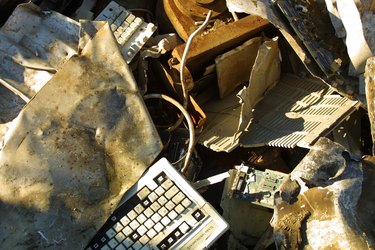
The Consumer Electronics Association estimates that American households have an average of 24 electronic products. With every new generation of smartphone, flat screen television and computer, the old ones become obsolete and candidates for disposal. The components in these devices may contain a number of toxic compounds, and there are an increasing number of laws that govern what electronics can and cannot simply be thrown in the trash.
Environmental Impact
Video of the Day
The primary dangers from tossing electronic devices into the regular trash stem from what happens to those devices when they reach the landfill. Hazardous materials in electronics that are dumped and left alone can leach into the earth and make their way into water supplies. If the devices are incinerated, there are additional dangers when the ashes produced by burning heavy metals and plastics are carried into the atmosphere and settle on land and in water, where their detrimental effects can become part of the food chain.
Video of the Day
Toxins
Cathode ray tubes in older televisions and computer monitors typically contain lead and other metallic elements and compounds that have immediate adverse health effects on humans and animals. Heavy metals, including mercury and chromium, also reside in components like switches, connectors, and circuit boards. Most consumer electronic devices are primarily made of plastics, which include polyvinyl chloride (PVC) and polybrominated diphenylethers (PBDE). Some of these metals and plastics, including PVC, are known carcinogens, and exposure to PBDE can damage the reproductive systems of humans and animals.
The Law
Most U.S. states have laws on the books or in the works to govern the disposal of used electronic devices. With hundreds of state and federal statutes governing the disposal of electronic waste materials, simply discarding an old computer or battery could be a violation of the law. Penalties are most severe for commercial violators, with fines as high as $2,000 per day for improper disposal or reporting. The resource listed below has information on current laws as well as recycling programs.